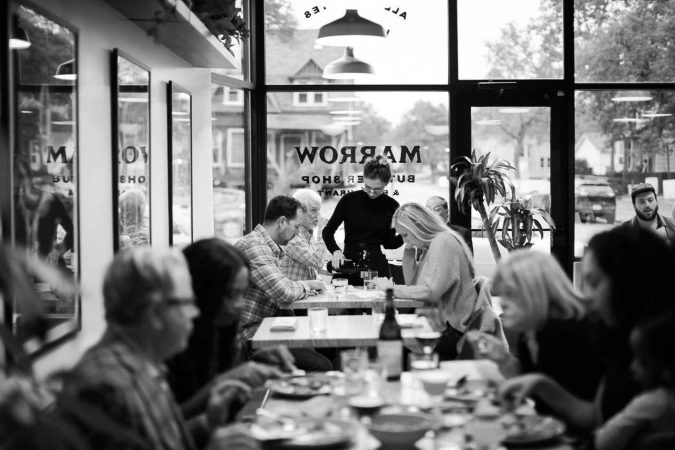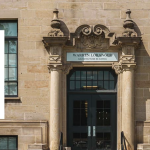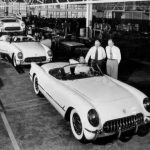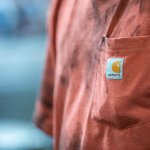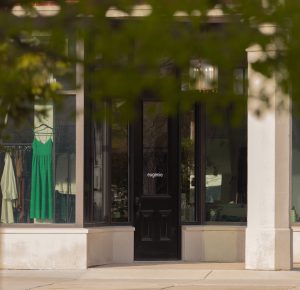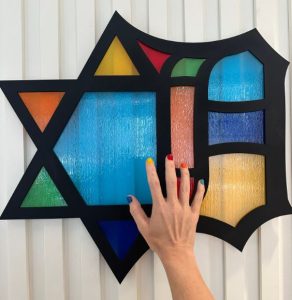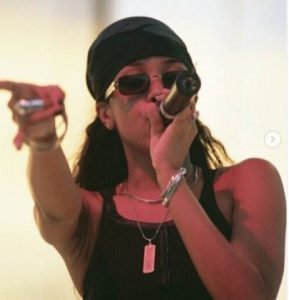Not because she has opened a wine bar and a restaurant/butcher shop in three years in a city she’s lived in for less than four—hats off for that—but because she has done it with grace and composure. I.e. she arrived on time for our interview at Marrow, calm and prepared for questions.
Ten minutes after meeting, it’s clear that Ping works while the rest of us sleep. She’s smart, determined and beloved by her staff. It’s an energy that can’t be faked.
Soon after this interview Chef Dominique Crenn became the first woman to be awarded three Michelin stars and Ping’s restaurant, Marrow, was declared Eater’s Restaurant of the Year. It’s a new day for an old industry.
If this interview is at all awkward, it’s because my questions are awkward. Talking so narrowly about gender is antiquated. But it’s reflective of an industry that is antiquated—and has historically been marked by inequality, violence, and sexual harassment. Thanks to people like Ping, the vision of restaurants as safe spaces for all beings to work is one within reach.
CV Henriette: What brought you to Detroit?
Ping Ho: Opportunity—personal reasons as well. I came to Detroit a couple of times with my partner then, and we both saw an interesting city, things were happening here in Detroit. I had been working with a big music company for ten years at that point, and I knew I needed a change. I wanted to get out of the corporate world. The idea of opening a small business in Detroit took root. Seeing what was happening here in the city, and thinking about the opportunity to sell everything in New York, and invest in Detroit became real, and we did it.
CVh: The word authentic gets thrown around a lot these days, but it seems you made a concerted effort to embed yourself in the fabric of the city. Do you agree?
PH: When I moved here three and a half years ago downtown Detroit was not as developed. It made me think about what Detroit needs—there were not a lot of places to buy and drink good wine. That’s how the Royce came about. With Marrow—living here, having lived here for the past few years, I realized there was not that many good places to shop for fresh food, especially meat that’s organic, locally sourced—while we’re surrounded by farms in Michigan. So I thought the concept of a restaurant/butcher shop hybrid would do well here. It’s taking ideas inspired not just from New York, but Singapore where I grew up, my travels and thinking about what I would like as someone living in Detroit. Amenities—from a wine shop to a butcher shop, etc
CVh: You’ve been living here for a few years. How is the day-to-day?
PH: It’s a relatively small community. Everyone knows each other, at some point, for better or for worse, I’ve found it relatively easy to work here. How I met Chef Sarah Welch, for example, was really through the grapevine. I ran into her getting coffee a few days after she left Republic. These are things that happen in a smaller place. In a big city like LA or NYC, it’s much harder to just run into people, get to know them and start collaborating.Detroit is a great place to be based. Travel is easy enough. It has been encouraging being here. I have met really good friends in a short span of time. They say the older you get, the harder it is to make good friends—I don’t find that true at all. In fact I’ve made a lot of extremely close friends here over the last three years. It’s been an overall very positive experience, as someone who’s an outsider.
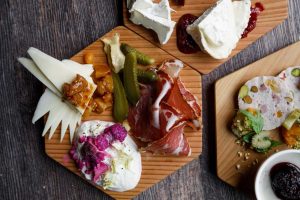
MARROW
CVh: Speaking of collaboration, you’ve managed to create some successful and unique ones: your kitchen is run by women—something outside the norm in a male dominated industry. What’s the intention?
PH: For sure, at Marrow, and even at the Royce, we are predominantly female. It’s important on a few different levels—not just providing opportunities for women to advance in their careers, but also leadership. The leadership roles are filled by women. From Chef Sarah Welch to Amanda Franke, my GM, these are women at the helm of a business. At the Royce our manager, Julie Helman is female as well—it’s about granting opportunities to women in an industry traditionally dominated by men at the upper levels of management, power and ownership.
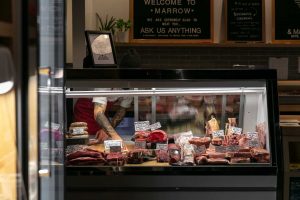
MARROW BUTCHER SHOP
CVh: To be very broad here, do you think that women run a restaurant different than men might? What’s the impact on the culture of the business?
PH: I do feel that women have different strengths—not to overgeneralize around gender lines, but do feel women are better team workers, collaborators and make for better managers. They’re also a little more intuitive, a little more emotionally in tune to the needs of people on the team. I do think there is a difference. My caveat is I am pretty to new the restaurant industry, the hospitality business, but, from what I understand, kitchens in a lot of restaurants are dominated by strong male figures. Just look around the country: the top chefs are majority men. Here I am excited for a female team to run the show.
CVh: As a female, have you faced any challenges opening your businesses?
PH: Not any gender related. I’ve been pretty lucky in terms of my resources to be able to open both the Royce and Marrow. One of the things I’ve learned is that it’s not an easy business to get into. It’s quite capital intensive. Partly because of my background in the corporate world, I knew how to navigate the fundraising from a decade of doing business in New York. The ongoing challenges of running this business? It can be competitive. I think staffing and labor are the most important things, and can make or break a business—as well as cost control. These are things I find general to every business in this industry. I think I feel luckier than most where, in regard to timing, access to resources, and people I’ve met along the way who have become part of the team—all these things have come together in a good way. I wouldn’t say I’ve faced adversity as a woman.
CVh: What new businesses would you like to see?
PH: There’s been a good influx of people opening bars, restaurants and bakeries. The next level would be amenities that are perhaps educational, class oriented places for people to engage in activities other than eating and drinking. And Groceries, I’ve read that Plum Market is opening downtown. I’d love to see more day to day amenities—nail salons, cobblers, places to drop off your laundry. Stuff that is kind of basic that many neighborhoods in Detroit still lack. Basic amenities.
On a higher level, I would like to see more entrepreneurs come in with tech ideas. I would love to see more graduates from University of Michigan in Ann Arbor come and incubate new ideas in Detroit that have to do with the next generation of—it doesn’t have to be auto, but we are the Motor City—of auto related technology or apps that have to do with social or music media. Music has a long tradition in Detroit. Building on that. The creative side of things.
CVh: You make it seem so easy! What advice would you give to someone looking to open a business in Detroit who might find the prospects daunting?
PH: I would advise them to meet as many people as possible. Talk to people who have done it. Cultivate mentors. Cultivate friends in the industry who can give advice on the various aspects of things. One thing I would add, and I know there’s a statistic out there, Detroit has a much higher percentage of female entrepreneurs than many other places in the US. There are a few reasons for that. There are networks and organizations that specifically help small business owners and women apply more. Look at Kirstin at Vegan Soul, Lisa at Sister Pie, Kiki & Rohani at Folk and Farmer’s Hand—they are my good friends. These are all examples of lady bosses who have done it.
I’ve had the privilege of meeting them, and along the way as I’m running Royce, and starting Marrow, being able talk to them about certain things. Davita Davidson at Food Lab—these are resources that are specific to Detroit, and it comes to the history of Detroit struggle for decades and then at some point realizing “OK. We need to support small, local business. We need more amenities. We need more restaurants. We need more cafes, bakeries.”
For someone who wants to start a business, male or female, I would say start there. Look at local organizations like Invest Detroit, Detroit Development Fund, Motor City Match. These are things that are so unique to Detroit.


